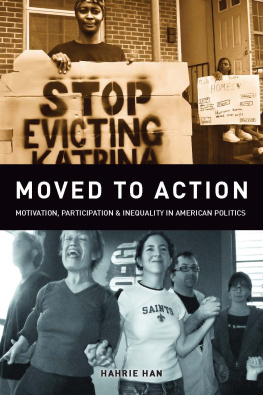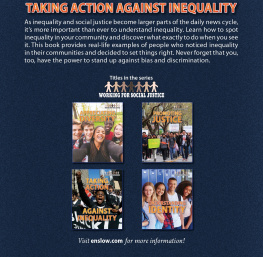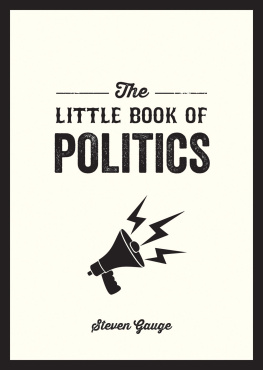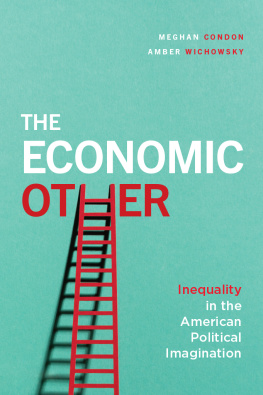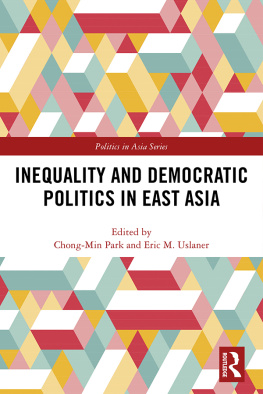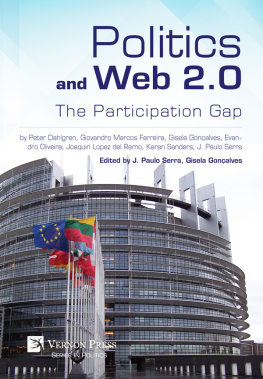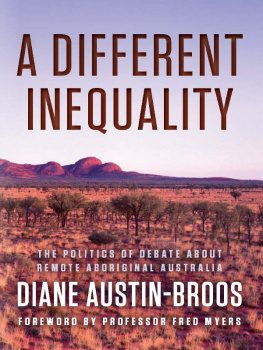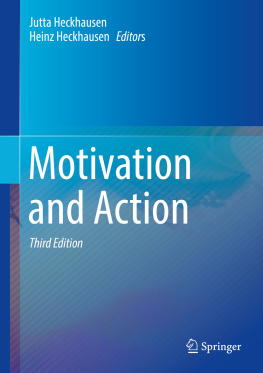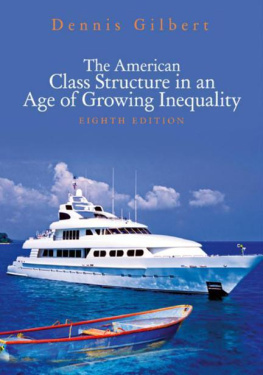Stanford University Press
Stanford, California
2009 by the Board of Trustees of the Leland Stanford Junior
University. All rights reserved.
No part of this book may be reproduced or transmitted in any form or
by any means, electronic or mechanical, including photocopying and
recording, or in any information storage or retrieval system without the
prior written permission of Stanford University Press.
Printed in the United States of America on acid-free, archival-quality paper
Library of Congress Cataloging-in-Publication Data
Han, Hahrie.
Moved to action : motivation, participation, and inequality in
American politics / Hahrie Han.
p. cm.
Includes bibliographical references and index.
9780804772440
ISBN 978-0-8047-6225-0 (pbk. : alk. paper)
1. Political participationUnited States. 2. Motivation (Psychology)
Political aspectsUnited States. 3. EqualityUnited States. 4. Poor
United StatesPolitical activity. 5. People with social disabilities
United StatesPolitical activity. I. Title.
JK1764.H358 2009
323.0420973dc22
2009010152
Typeset by Bruce Lundquist in 10/15 Sabon
Acknowledgments
I HAVE MANY PEOPLE TO THANK for help with this project. Writing the book has been an exhilarating, at times frustrating, but ultimately rewarding journey. David Brady, Mo Fiorina, and Jon Krosnick deserve special thanks for their help in the early stages of this project. No one deserves more thanks (or blame) for making me stick with political science than David Brady. From our first discussions about Texas to our many discussions about this project, Brady has been uncommonly generous, not only with advice but also with Sunday afternoon time on his back porch, tickets to Stanford baseball games, and too many lunches and dinners to count. As a mentor, colleague, and friend, he has taught me an enormous amount about research, political science, and life. For that, I owe him an enormous intellectual and personal debt. Luckily we often have contradictory predictions about politics, and I trust Ill whittle away my debt through more wagers over the years. Serendipity put me into contact with Jon, and his work on issue publics eventually laid the foundation for this project. Laying this foundation, however, was no easy task. Jon kindly provided a lot of thoughtful advice, constructive critiques, and time. Mo Fiorina never failed to make incisive comments, modeling the precision and panache that characterize his writing and thinking. I hope to someday think as clearly as he does about the questionsand answersin my research.
Many others helped shape the project into a book. Paul Sniderman has been amazing in helping me develop ideas for the book and navigate my way through the writing process. He was the first person to make the distinction between the personal and the political, and it took me two years to understand the wisdom of what he was saying. The acuity of his advice never surprises me, but I am repeatedly surprised by how generous someone as busy as Paul can be to a young scholar. Marshall Ganz has been a friend and mentor since college and has always challenged me to look beyond my computer to understand how politics works. He consistently helps me understand and articulate why these questions matter and what participation means in a democratic society. Dennis Chong read the manuscript at several different stages and provided crucial advice each time. His comments about participation among the underprivileged shaped the direction the manuscript ultimately took. Jamie Druckmans comments on several chapters helped me articulate the points I was making much more clearly. Taeku Lee took an interest in the project at a point when I was casting about for help and provided the intellectual direction, encouragement, and support that I needed.
The fifty-eight people who agreed to be interviewed for the Study of Political Pathways deserve special thanks. For confidentiality reasons, I cannot thank them explicitly here, nor can I list the many people and organizations who helped me recruit them. It was a fascinating experience to learn about each persons journey to political participation and inspiring to hear about the commitments these people made to participating in public life. I appreciated the willingness of each interviewee to engage in frank and open discussions and to be probed with sometimes personal and challenging questions.
At Wellesley College, Marjorie Schaeffer provided invaluable research assistance for the Study of Political Pathways. With intelligence, humor, and persistence, she recruited subjects, conducted interviews, and transcribed the audio files (twice!). Emily Sy and Catherine Chen both stepped in at clutch moments to help us finish work on short notice. Lindsay Miller provided able assistance with some literature reviews and data analysis. I am eager to see the great places all of these women will go. All of my colleagues in Wellesleys political science department have enriched my experience as a junior faculty member and given me support as I was finishing this project, especially those in American politicsTom Burke, Marion Just, Wilbur Rich, and Nancy Scherer. The Knafel Assistant Professorship in the Social Sciences provided generous funding for the project.
In addition, Matthew Levendusky, Chaeyoon Lim, and an anonymous reviewer provided unusually helpful advice on the manuscript in its final stages. Matt and Chaeyoon, along with many other friends from graduate school, manage to make this work actually fun. There are many others whose contributions were invaluable, including Claudine Gay, Simon Jackman, Jeanette Lee-Oderman, Doug McAdam, and Eliana Vasquez. Kathryn Ciffolillo did an excellent job editing the manuscript. It was a pleasure working with Stacy Wagner and Jessica Walsh at Stanford University Press.
Finally, many friends and family inquired politely about my progress through the years and remained supportive even when my responses were muddled. Hilary Conklin and Peter Han get special kudos for reading my turgid academic prose and providing great feedback. As they have been many times in the past, Mom, Dad, Peter, Meredith, Steve, Carol, Hilary, and Scott were just the cheerleaders I needed at crucial times. Kaya was not even a gleam in our eyes when this project began, but now it is she who makes it all worthwhile. More than anyone, I thank Hunter. Who he is and what we share still stuns me every day. For all of that and much more, I dedicate the book to him.
CHAPTER 1
The Challenge of Political Equality
IN THE SPRING OF 2006, New Orleans held its first election to choose a new mayor since Hurricane Katrina devastated the city. Only 38 percent of eligible voters participated. When compared with the 46 percent turnout in the 2002 race and the 38 percent who voted in 1998, this 2006 turnout seems unremarkable. But it was remarkable because of the large numbers of hurricane refugees who went to great lengths to participate. Six months after floodwaters inundated the city in late August 2005, more than half of New Orleanss 450,000 residents remained in exile, in particular the poorer, less educated African-American residents. Yet 113,591 of these residents found ways to cast ballots for mayor, many of them overcoming huge barriers in order to participate in the political process.
This book unravels the reasons for participation among people like the Katrina refugees by providing insight into the personal commitments that motivate participation among traditionally marginalized people. The book seeks to answer the question, How do people without many educational, financial, and civic resources become engaged to participate in politics? Most research on political participation looks at the whole population and asks, What kinds of people are most likely to participate? Previous researchers have concluded that people who generally care about politics (i.e., are motivated), are able to participate (have resources), and are asked to participate will participate. But they are not the only ones who do. There are many instances, like the 2006 mayoral election in New Orleans, in which people who lack the resourcessuch as education, money, free time, civic skillsand the general political interest commonly thought necessary do participate. This book explores why.

